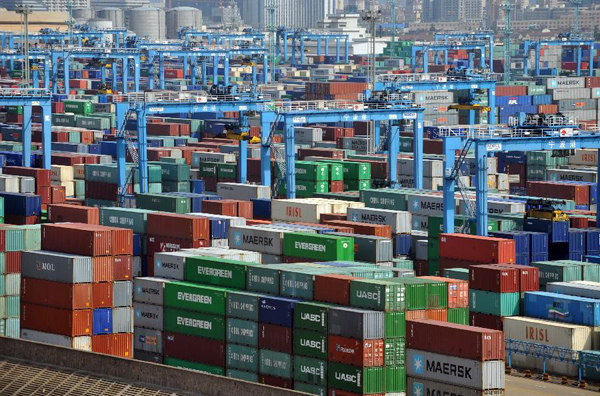FDI outlook darkens amid European debt crisis
 0 Comment(s)
0 Comment(s) Print
Print E-mail China Daily, June 15, 2012
E-mail China Daily, June 15, 2012
 |
|
Photo taken on Aug. 10, 2011 shows containers at the harbor of Ningbo, east China's Zhejiang Province. [ Photo/Xinhua] |
Foreign investment capital inflows may have slowed last month, and there might have even been an outflow driven by hedging risks, amid market worries over the European debt crisis and China's economic slowdown, according to economists.
Huo Jianguo, director of the Chinese Academy of International Trade and Economic Cooperation under the Ministry of Commerce, said foreign direct investment was likely to have been weak.
"I expect the nation's FDI continued to drop in May, or, if we were lucky, turned to grow slightly," said Huo.
He cited downward pressures on the nation's economic growth and the intensifying European debt crisis.
"Neither of these factors could support high growth in the nation's FDI, although local governments are taking active steps to boost FDI," he said.
"Considering the uncertain overseas scenario, the government is moving to boost the domestic consumption of low- and middle-income groups, and the foreign trade may slightly rebound starting in June," He Keng, vice-chairman of the Financial and Economic Committee of the National People's Congress, said on Thursday at a forum in Beijing.
"China's full-year GDP growth rate is likely to remain above 8 percent," he added.
However, the slowing trend of the world's second-largest economy can be hardly reversed in the short term, according to He.
China is the largest destination for FDI among emerging markets and the second-largest worldwide after the United States. Last year, FDI surged 9.7 percent to a record high of $116 billion.
But due to the European debt crisis, FDI had fallen for sixth consecutive months as of April, when it decreased about 0.7 percent, according to the Ministry of Commerce.
From January to April, it fell 2.4 percent to $37.88 billion.
Liu Yajun, director of the Foreign Investment Administration at the Ministry of Commerce, told China Daily that China is very concerned over the outlook for FDI, saying future foreign investment is "unpredictable" in light of the sluggish global economy.
The European debt crisis is a major reason for the FDI decline in China. Investment from the EU during the first four months of this year slumped 27.9 percent to $1.9 billion. Investment from the United States rose 1.9 percent to $1.05 billion in the same period.
A survey by the European Chamber of Commerce found that 22 percent of European companies that have presence in China are considering transferring their investment.
Zheng Xinli, vice-chairman of the China Center for International Economic Exchanges — a government think tank — as well as a guest economist of China Daily, noted that export growth averaged 8.7 percent in the first five months.
That was less than the previous whole year's 10 percent gain, and it led to a sharp decrease in the yuan position for foreign exchange purchases.
"The recent appreciation of the US currency has attracted international capital to hedge risks by holding dollars, which reduced fund inflows into China," said Liu Yihui, an expert with the Financial Research Center of the Chinese Academy of Social Sciences. "China's cooling economy also resulted in outflows of foreign capital."
"In May, it is possible that yuan positions for foreign exchange purchases continued to drop, by 100 billion yuan ( $15.8 billion)," he said.
According to the People's Bank of China, the central bank, financial institutions' yuan positions for foreign exchange purchases declined 60.6 billion yuan in April to a balance of 25.59 trillion yuan, the first drop in three months.
Shen Danyang, Ministry of Commerce spokesman, said at its monthly news briefing in May that there are various reasons behind the continued decline. But he emphasized that it is a temporary situation, and China is confident in the long-term foreign investment outlook.
"I don't see a decreasing trend of FDI in the long run, as interest in the Chinese market is continually increasing among foreign companies and investors," said Robert Morrice, chairman and chief executive for the Asia-Pacific at Barclays Bank Plc.
As the government has ample room to fine-tune policies to stabilize the economy, a soft landing is expected in China, according to Alistair Lowe, an executive vice-president involved with global equities at State Street Global Advisors, the world's second-largest asset manager.
"In the next three months, we may increase investment in China and other emerging markets," he said.





